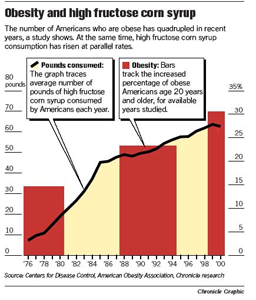High fructose corn syrup (HFCS) is defined as a syrup, which is made from cornstarch that’s been treated with an enzyme that converts some of the glucose in the molecule to the fructose, which is sweeter. Because of its ability to preserve and extend processed foods’ shelf life (and it is cheaper than sugar) it has become a very popular ingredient in many fruit-flavored drinks, sodas, and other processed foods. Check your food labels! You’ll be amazed by how many foods contain high fructose corn syrup.

Some nutrition experts have blamed increased consumption of high-fructose corn syrup as the main culprit for the growing obesity problem in our nation. One theory being, that fructose is more readily converted to fat by your liver than is sucrose, increasing the levels of fat in your bloodstream; but unfortunately, research has not been able to prove this yet. Also, some animal studies have found a link between adverse health effects (high cholesterol, diabetes) and increased consumption of high fructose corn syrup. Once again research is lacking here, because the evidence is not as clear in human studies.
The Corn Refiners Association is now trying to down play HFCS by doing a campaign of commercials stating that HFCS is like table sugar and is OK to consume. They do note that it’s OK to consume in moderation (which is true for most things), but rarely does our society consume items in moderation. If we did practice moderation I believe the obesity epidemic sweeping our nation would not exist.
Although research is lacking to give a direct correlation, caution should be taken when consuming these HFCS, processed foods. Typically, these foods are high in calories and low in nutritional value.
Here are some ways to reduce your intake of HFCS:
- Read food labels
- Consume fresh fruits in place of fruit-flavored drinks
- Buy 100% juice
- Limit your soda intake
- Purchase fruit canned in its own juices instead of in heavy syrup

Yes, HFCS is correlated with weight gain but it’s important that people take better responsibility for their health and bodies. If you want someone to blame, look in the mirror.